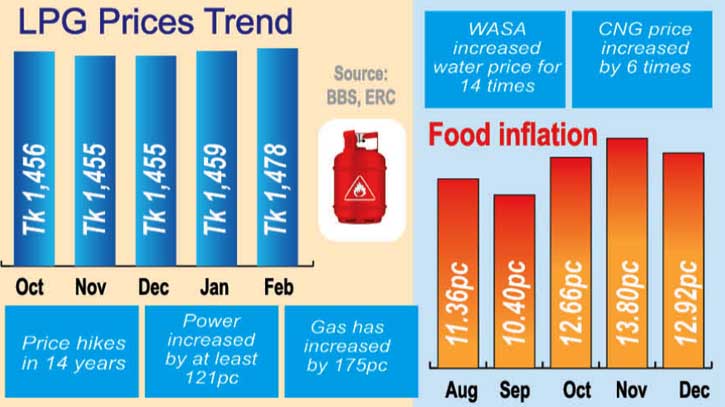
Photo: Messenger
In one hand price of daily commodities are increasing, on the other hand cooking cost also rising amid high food inflation. Middle and lower middle people are struggling to survive in the expensive economy. Earlier, the government increased the VAT and income tax which already has created pressure on the middle- and lower-income people. This price hike of the LPG created additional pressure.
Due to domestic natural crisis, pipeline users also use PLG for cooking as they don’t get gas as per their rush hours. Resulted, a huge number of people are facing combating with the pressure.
Onindita, a working woman go to office at 8 o clock but she doesn’t get gas at that time. Though, she has the pipeline gas facility but she has to use PLG for emergency. She told the Daily Messenger, “I have to pay the gas bills and in addition I have to pay for LPG to because of gas crisis. In the mean time if PLG price continues to rise where we will for an easy life.”
Mohiuddin Ahmed, an employee of an internation garment factory said “I have to use LPG but all most every month price is rising. Moreover, we cannot buy from retail market at government fixed price. If the government rises Tk 19, I will have to pay Tk at least 50.”
On Sunday, the government has increased Tk 19 for per 12kg LPG which is mostly use for cooking. Meanwhile, the price of “Autogas” (LPG used for motor vehicles) has been increased by Tk 0.89 per litre, setting the new price at Tk 67.74. BERC announced that the new prices will be effective from 6pm on 2 February.
Prices for other sizes of LPG cylinders ranging from 5.5 kg to 45 kg will also rise accordingly, the BERC added. According to media reports, the decision to increase the prices was attributed to the rising international prices of LPG and the depreciation of the Bangladeshi taka against the US dollar. The average import price of LPG has increased by $10 per tonne.
The Energy and Mineral Resources Division increased the prices of diesel, kerosene, petrol, and octane by Tk 1 litre.
In January, the price of LPG was adjusted twice. Initially, the price was increased to TK 1,459 following a value-added tax (VAT) hike. Despite a decrease in international LPG prices in January, the price was kept unchanged due to the depreciation of the US dollar.
Since April 2021, the BERC has been adjusting LPG prices monthly based on fluctuations in the Saudi prices. However, consumers have often complained that the actual market price of LPG is higher than the price set by the BERC. LPG witnessed the highest price at Tk1,498 (per 12kg cylinder) in the local market in February 2023.
Prof Shamsul Alam, advisor to Bangladesh Consumers Association (CAB) told the Daily Messenger “The government is hiking the prices to tackle their miss management. They don’t think the public interest.”
Dr Khondaker Golam Moazzem is a prominent industrial economist in Bangladesh currently serves as the Research Director at the Centre for Policy Dialogue (CPD) CPD told the Daily Messenger “Mainly, the government is hiking the prices aiming to come out from subsidy support. This kind of price hiking, the mass is being affected directly, especially the households.
Without hiking the fuel and power prices, the government can decrease the subsidy and control the inflation.” He said, if the government can stop such power plants which demand high-capacity charge, cut import of LNG increasing domestic fuel like gas and coal, price might not be increased. Then general people can get rid of from repeated price hiking pressure.”
“Power and diesel price directly connected with the agriculture and transportation that impact the all kind of expenses. Cost of house hold including cooking increases instantly,” he said. Due to massive privatization and import based energy sector, the price of the utilities are increasing massively.
If the government could make prudent sector piece of gas and power would be affordable, he added. In the last 14 years, the price of electricity has increased by at least 121 percent at the consumer level in 12 phases. And the average price of gas has increased by 175 percent in five phases.
The price of CNG in the transport sector has increased six times. Apart from this, the price of diesel has increased by about 237 percent and the price of octane and petrol has reached about 169 percent. On the other hand, Dhaka WASA has increased the price of water 14 times.
Apart from this, the diesel price has been increased by around 237 percent. Moreover, Ramadan demanded products price has increased also, Sugar price raised by 29 percent, Dates price 17 percent lentils price by 8 percent during couple of months, according to retail market.
In addition, due to inflationary pressure people from the middle class and lower income have cut intaking protein from their meals by 49 percent, according to Global Food Security Index (GFSI).
Messenger/Tareq








